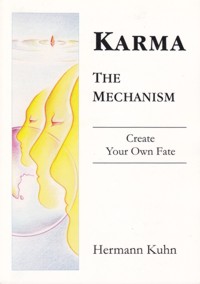
Darshana charitra mohaniya kasaya nokasayavedaniyakhyastridvinavasodashabhedah samyaktva mithyatvatadubhayanikasayanokasayau hasyaratyaratishokabhayajugupsastripunnapumsakaveda anantanubandhyapratyakkhyanapratyakhyanasamjvalanavikalpashchaikashah krodhamanamayalobhah (9)
Karma that causes delusion (mohaniya) obstructs 1 - our orientation towards growth (samyag darshana) by manifesting- confusion, error and misunderstanding
- mixed misunderstanding and true comprehension of the world's mechanisms
- (slight) clouding of true comprehension by wrong interpretation and error
- passionate negative emotions like anger, pride, the intention to deceive others or greed, which appear in four intensities
and
nine impeding tendencies:- excessive laughter
- overindulgence
- boredom, dissatisfaction, exhaustion
- worry
- fear and insecurity
- disgust, indignation, aversion
- compulsion to search for (new) female sexual partners
- compulsion to search for (new) male sexual partners
- compulsion to search for (new) sexual partners of both genders. (9)
Intuitive orientation towards growth (samyag darshana)
Intuitive insight - darshana[41] - is the intuitive weight we assign to experiences and information.
Intuitive orientation is a fundamental experience of our life. On the basis of intuitive understanding we select from the multitude of potential actions the one path that appeals to us as the most attractive. Our intellect plays hardly any role in this process. In the fast pace of daily life it is far too slow to consider all the complex consequences of our actions in advance.
Yet we also experience that our intuition may lead us astray at times, - we do not always get desirable results when we follow our intuition.
To exclude this uncertainty the Tattvarthasutra describes a variation of this mechanism: - a special type of intuition that is grounded in the orientation towards growth (samyag darshana).
When we orient towards inner growth, we neither experience doubt nor hesitancy that often accompany our usual premonitions or intuition. On the contrary, - we experience sudden understanding, a crystal-like recognition that the blockages are gone that only a second ago obscured our consciousness. It feels as if we finally step into the light, are finally able to see clearly. An immense freedom floods our heart, - an elation always accompanied by enlightening insights into a level of understanding that eluded us before.
Any problem that previously overwhelmed our emotions and our consciousness disappears. It became irrelevant once the higher level of comprehension opened within us. This new understanding separates us from the one-sided perspective that previously made the problem appear insurmountable. Though none of the physical circumstances have changed, our disposition is fundamentally altered. We now perceive a path to a solution; the emotional load falls off our heart and we feel the elation mentioned above.
It is not easy to find general examples for these breakthroughs since they are of intrinsically private, individual nature. Yet we probably all know the following situation: Out of the blue an old friend suddenly treats us with inexplicable, cold behavior. We feel mistreated, emotionally hurt, and wonder what we have possibly said or done to cause such intense rejection. We have no idea how to correct the situation. Somehow our joy of life is dimmed. - Then we come to know that several tough misfortunes have befallen him. We realize that we only interpreted his preoccupation with his problems in a negative way. We understand that he even had the intention not to burden us with his worries. A load lifts from our heart.
This insight in the inner motivation of another person, this extending our scope of life to another (individual) reality usually produces a feeling of elation that illustrates the character of the breakthroughs described above. Nothing has changed in the material circumstances, but our sovereign new understanding now enables us to pursue a different course of action than before. Instead of causing a breakdown of communication and thereby losing a friend - as it often happens in these situations - we now are able to offer loving support that may really help.
When we orient towards inner growth, we gain clear insight how to intuitively select from all the potential paths of daily life the one optimal action that brings us closer to freedom from karmic restrictions.
Once we actively orient towards growth, we become able to intuitively recognize error. We now automatically identify flaws, inaccuracies and misunderstandings introduced by our senses, teachers, during our study of external knowledge or in clairvoyant perceptions and can bar their influence on us.
Intuitive orientation towards growth is a natural feature of our consciousness. It can manifest in all living beings who possess a mind and are able to reach enlightenment. It arises automatically when karma that obstructs this ability dissolves or becomes inactive - this is the inner cause. Externally it manifests (after the respective karmas are gone) either spontaneously[42] without outside help, or when triggered by external factors (e.g. the help of a teacher or by reading about the expansion of consciousness).
Karma that hinders or stops us to direct our life towards expansion, manifests e.g. as indifference towards the true mechanisms of this world, as disinterest in the development of our potential abilities and in the inability to distinguish which of our actions produce positive or negative effects.
Directing our action towards freedom from all karmic restrictions
Karma that hinders us to focus activities on freeing our life from karmic restrictions, manifests in form of anger, pride, as the intention to deceive others and greed. These four negative passionate emotions cause powerful egoistic tendencies that strongly reject every expanding point of view.
Anyonesubject to this type of affliction is usually so intensely fascinated by the mere act of accumulating (material objects, status, security etc.), or by the attempt to bring back bygone experiences (power, recognition, the affection of others, the experience of falling in love, physical highs etc.) that he has neither time nor energy to attend to his inner growth.
Greed always originates in a disoriented mind. It causes us to assign such immense value to a small part of our environment that it prevents us from recognizing the entire world as 'our own'. Of the four basic negative emotions greed operates the longest. Its subtlest form affects us far up to the tenth stage of development.
As long as we succumb to these harmful tempers, we block all impulses that may lead us out of the cloud of our own negative emotions. They separate us from all mechanisms that can expand the narrow vision of life we are trapped in.
These negative emotions manifest in four intensities that are counted as separate types of karma. The four intensities are described in 'Attraction to Karma' - sutra 8.
Nine impeding tendencies
The nine impeding tendencies are moods that obstruct our progress. Though less powerful than the four negative passionate emotions, they severely hamper our growth by diverting our energy to meaningless themes. The nine impeding tendencies are not graded in different intensities. As we progress to the eleventh stage of development they gradually fall off. From the twelfth stage onwards they cease to influence us.
 Hermann Kuhn
Hermann Kuhn
